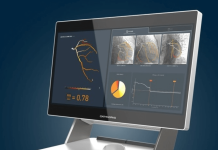After its portable, cartridge-based nasal swab test kit became the first at-home, nonprescription molecular diagnostic for COVID-19 to receive emergency use authorization from the FDA, Cue Health has set its sights on translating that technology into point-of-care tests for other diseases and conditions.

After racking up hundreds of millions in venture capital throughout the pandemic to support its COVID-19 test-making business, Cue Health will look to make its break into the public market with an IPO that could bring in up to $100 million more.
The diagnostic test maker—and member of the Fierce 15 class of 2020—registered with the Securities and Exchange Commission Wednesday its intent to go public. Though its preliminary S-1 filing didn’t outline the number of stock shares that’ll be offered, nor the price of each share or the date of the debut, it did propose a maximum total offering price of $100 million.
Once Cue does go public—whenever that is, and at whatever stock price—it’ll be traded on the Nasdaq under the ticker symbol “HLTH.”
The IPO will support Cue’s previously expressed plans to expand its success in developing testing tools for COVID-19 into other diseases and conditions.
In March of this year, after raising $100 million in venture capital and another $481 million in U.S. government funding to support manufacturing of its test kits, Cue became the first diagnostics maker to receive an FDA emergency use authorization for a molecular COVID test designed for at-home, over-the-counter use.
By May, however, the San Diego-based company had already shifted its focus to translating its hand-held, cartridge-based diagnostic technology to other areas of medicine. That month, Cue raked in a whopping $235 million from backers including Johnson & Johnson Innovation, Perceptive Advisors, Koch Strategic Platforms and more.
That funding, Cue said at the time, will support its plan to build out its testing platform to offer a broad slate of tests for both infectious diseases and respiratory, cardiovascular and sexual health. All of those tests would be run through the same diagnostic system and will offer test takers direct access to physicians through an accompanying telehealth platform.
In its prospectus, Cue expounded upon those plans, indicating that making the switch from a private to a public company would give it a major boost in its pursuit of a new era that it has branded “Healthcare 2.0.”
“Through our connected diagnostic solution, we seek to enable the shift of care to virtual settings, while also connecting the physical care paradigm to the new digital ecosystem,” it wrote.
To that end, according to the filing, while still pursuing full 510(k) clearance for its COVID-19 test, Cue is also actively building out its slate of other diagnostics. So far, five are already in “late-stage” development for influenza A/B, respiratory syncytial virus, fertility, pregnancy and inflammation.
The company said it plans to submit those tests for FDA authorization or clearance sometime in the second half of next year.
Are you hiring?


